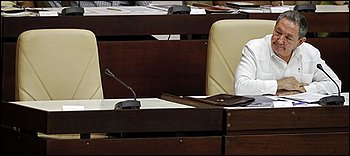
… and we pretend to work.
The long-standing Cuban axiom has come to bear more truth than its users may have hoped or imagined. President Castro announced yesterday in his address before the National Assembly that the Cuban government will actually begin to lay off redundant workers, which he estimates are perhaps 1 in every 5 workers on the island (some would guess even more than that).
Of course, guaranteed employment was a key element of the 1959 revolution in Cuba and has remained so: some 95% of the official Cuban workforce is employed by the state, standing testament to the strength of the guarantee. Could Raúl’s announcement simply be a warning meant to spur productivity? Probably not, as laziness is not the only problem but lack of actual work and/or tools contribute (or perhaps better put, misallocation of workers); 5 construction workers at a site with one brush and one hammer means 3 people are not working, by no fault of their own.
No, this statement is real.
Cubans who are let go from their current posts will be retrained or reassigned so that they will not stay out of work. The government, as ever, is trying to push and pull and tweak until the Cuban system is healthily operating without bending to whispers of free market, and while simultaneously seeking to achieve greater recognition of the value of work. As Raúl put it in April, “Without people feeling the need to work to make a living, sheltered by state regulations that are excessively paternalistic and irrational, we will never stimulate a love for work.” That love of work is a part of the “ideal” socialism.
And so the goal of “from each according to his abilities, to each according to his needs” (or as Havana has more often used this Marxist refrain in the last half century: “from each according to his abilities, to each according to his work“) remains. And the question of whether Cuba can create the right incentive system to accomplish this ever-elusive socialist ideal remains as well.
(AP Photo/Javier Galeano)